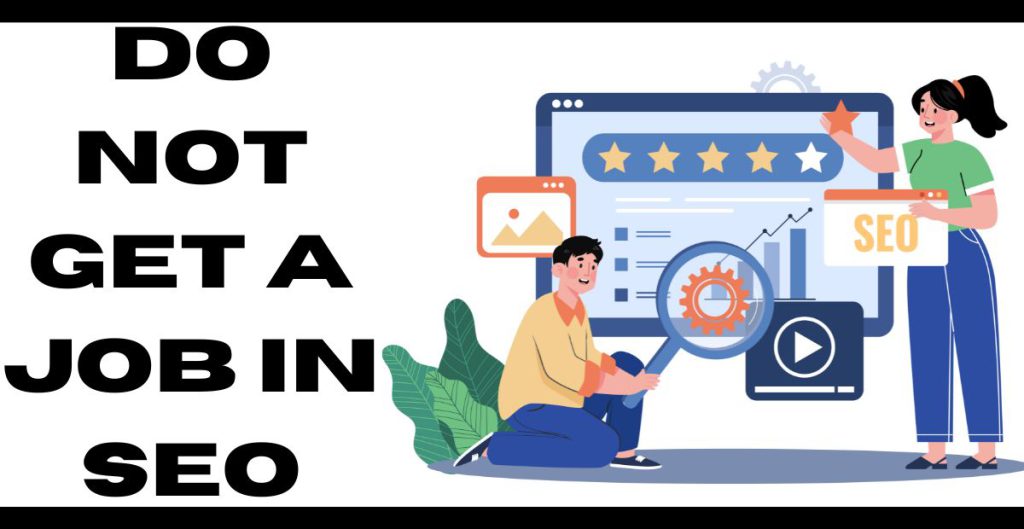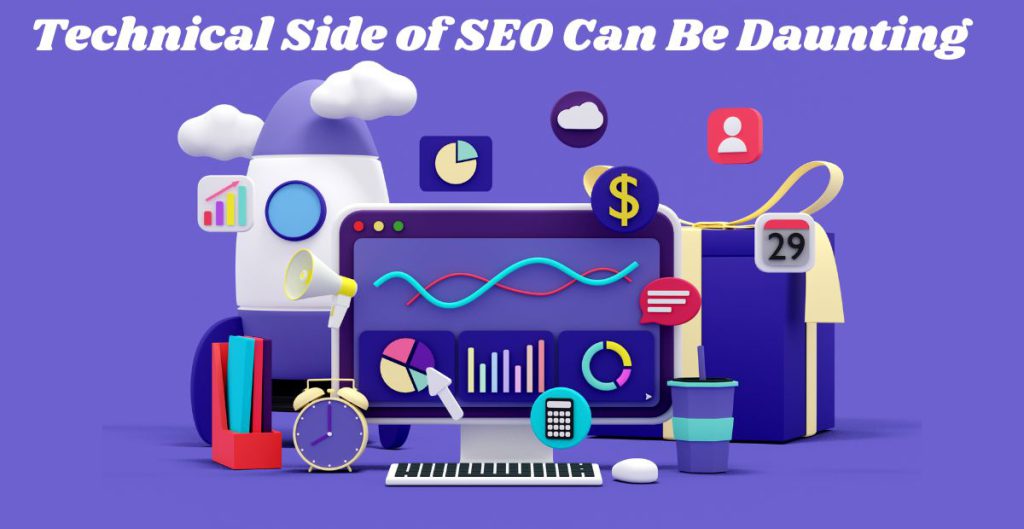
It is also impossible to enter the digital marketing industry without do not get a job in SEO. SEO jobs promise to help companies grow their online visibility, increase traffic, and ultimately drive sales. However, there are certain aspects of SEO jobs that many people overlook. While the profession is often praised for its potential, significant challenges could make you reconsider whether SEO is the right career path for you.
In this blog, we’ll explore why you may want to think twice before jumping into an SEO career, what the industry demands, and alternative ways to leverage SEO knowledge without becoming a full-time SEO professional. Finally, we’ll answer frequently asked questions to clarify common misconceptions.
1. SEO Is Constantly Changing
One of the biggest challenges in SEO is that the rules are constantly evolving. Google makes hundreds of algorithm updates each year, some of which can radically change how websites are ranked. For example, introducing major updates like Panda, Penguin, and Hummingbird caused many websites to lose rankings overnight, leaving SEO professionals scrambling to adapt.
Imagine putting hours of effort into optimizing a website for specific keywords, only to see that work is undone because of a new algorithm. This level of unpredictability can be incredibly frustrating, especially if you prefer stable, predictable work environments.
Why It’s a Problem:
If you prefer long-term, stable career strategies, the constant change in SEO can feel overwhelming. It’s not just about keeping up with trends; it’s about rapidly adjusting your approach to avoid penalties or take advantage of new ranking factors.
Alternatives:
If you love marketing but want to avoid constant change, consider other digital marketing fields, such as email marketing, content marketing, or paid search advertising (PPC), which tend to have more predictable strategies.
2. SEO job Is Highly Competitive
The SEO job market is becoming increasingly saturated, making it difficult for beginners to stand out. With more companies realizing the importance of SEO, the competition for roles is fierce. Large companies have entire teams dedicated to SEO, while smaller businesses hire freelancers or agencies to handle it.
This increased demand also means that SEO professionals need to bring more to the table, often requiring extensive experience, skills in content writing, data analysis, and even coding knowledge.
Why It’s a Problem:
Breaking into SEO can be challenging if you don’t have a background in marketing or tech. Even if you land a job, advancing your career can be difficult because of the competition. You’ll need to constantly upskill, attend webinars, follow industry leaders, and experiment with new strategies to stay relevant.
Alternatives:
Rather than focusing solely on SEO job, consider broadening your digital marketing skill set. Learning about data analytics, user experience (UX), or paid advertising will make you more versatile and increase your job prospects.
3. SEO Takes Time to Show Results
SEO is a long-term game. It’s not unusual for SEO efforts to take months, even years, before showing significant results. If you enjoy quick wins and immediate feedback from your work, SEO might not be your best career path.
While there are ways to see quicker results with local SEO or optimize content for less competitive keywords, these methods don’t guarantee long-term success. The waiting game can be stressful, especially if clients or employers expect faster investment returns.
Why It’s a Problem:
SEO is often seen as a slow-burn strategy; many businesses need help understanding this. They might expect immediate results, and as an SEO professional, you could find yourself under pressure to deliver the impossible. This can lead to frustration and burnout.
Alternatives:
If you thrive on quick results, you might be better suited to a career in paid advertising (PPC), social media management, or conversion rate optimization (CRO), where you can see immediate campaign feedback.
4. The Technical Side of SEO Can Be Daunting

SEO is about more than isn’t just writing good content or getting backlinks. It hasThere’s a highly technical aspect, especially regarding website architecture, mobile optimization, and page speed. SEO professionals need to understand HTML, CSS, JavaScript, and sometimes even more advanced programming languages to ensure websites are optimized for search engines.
If you’re not tech-savvy or you don’t enjoy dealing with technical aspects of website management, SEO can become a headache. The learning curve can be steep, and you might need help to keep up if you’re comfortable with technology.
Why It’s a Problem:
SEO is no longer just about content and keywords. The rise of mobile search, voice search, and new technologies like AI-driven optimization means that SEO is becoming increasingly complex. If you’re prepared to dive into the technical side of things, you’ll find staying relevant in this field easier.
Alternatives:
If you enjoy the creative side of SEO but would like to avoid the technical aspects, content marketing or social media marketing might be a better fit. These fields still allow you to work with content and drive traffic but don’t require as much technical know-how.
5. SEO Can Be Stressful and High-Pressure
The expectations placed on SEO professionals can be enormous, especially if you work for a company that depends heavily on organic traffic. When rankings drop or traffic declines, the SEO team is often held responsible, even though many factors outside their control can affect a website’s performance.
The pressure to constantly deliver results, stay ahead of competitors, and adapt to Google’s ever-changing algorithms can lead to burnout. In addition, some companies expect SEO to be a “magic bullet” that will immediately boost their bottom line, which adds to the stress.
Why It’s a Problem:
SEO can be very rewarding when things go well but incredibly stressful when they don’t. If you struggle with high-pressure environments or unrealistic expectations, SEO might not be the best choice for you.
Alternatives:
If you love marketing but want a less stressful job, consider working in fields like content strategy or customer relationship management (CRM). These roles still allow you to influence customer behaviour and work with marketing strategies but tend to have more manageable expectations.
6. SEO is Becoming Automated
With the rise of AI-driven tools and automation in the SEO industry, more repetitive tasks like keyword research, link building, and content optimization are becoming automated. While this can make the job easier, it also means that some SEO roles are becoming redundant.
AI tools like ChatGPT, Jasper, and SurferSEO can now handle many of the tasks that used to require human input. This means fewer job opportunities for entry-level SEO professionals and a greater emphasis on higher-level skills like strategy and data analysis.
Why It’s a Problem:
Automation is reducing the need for junior SEO professionals, and the industry is becoming more reliant on technology. If you’re considering a long-term career in SEO, you’ll need to focus on high-level skills AI can’t replicate, such as creativity, problem-solving, and critical thinking.
Alternatives:
Rather than specializing in SEO, you could focus on becoming a digital marketing strategist or a growth hacker, where SEO is just one part of a larger skill set. These roles are more future-proof as they require a harder combination of skills to automate.
Read More: How to Use Keywords for SEO
7. SEO Is Not a Quick Way to Make Money

If you’re considering a job in SEO because you’ve heard it’s a lucrative field, think again. While experienced SEO professionals can make good Money, reaching that level takes years of experience. Entry-level SEO roles often pay modest salaries, and freelance SEO work can be difficult to find and inconsistent.
SEO is not a “get rich quick” career. It requires a lot of patience, hard work, and continuous learning. SEO is probably not the right choice if you’re looking for a job with immediate financial rewards.
Why It’s a Problem:
Many people enter the SEO industry thinking it will lead to a high-paying job or a lucrative freelance career, only to find that it takes years to build the necessary skills and reputation. If you’re not prepared for the long haul, SEO can feel like a lot of effort for little reward.
Alternatives:
If your goal is to make Money quickly, you should focus on e-commerce, dropshipping, or paid advertising, which can yield quicker financial returns.
FAQs
1. Is SEO a dying career?
SEO is not dying, but it is evolving. While automation and AI are changing the industry, there is still a demand for skilled SEO professionals. However, the nature of the job is shifting towards more strategic, high-level tasks.
2. Can you make a lot of Money in SEO?
Yes, experienced SEO professionals can earn good Money, especially those who work with large companies or manage successful SEO agencies. However, it takes years of experience to reach that level.
3. Is SEO a good career for beginners?
SEO can be a good career for beginners, but it’s challenging. The industry is competitive and has a steep learning curve, particularly regarding technical SEO.
4. How can I learn SEO without becoming a full-time SEO professional?
You can take online courses, attend webinars, and read SEO blogs to learn SEO basics. Understanding SEO is valuable in many digital marketing roles, even if you don’t become a full-time SEO professional.
5. What skills do I need to succeed in SEO?
To succeed in SEO, you need a mix of technical skills (such as HTML and Google Analytics), analytical skills (to interpret data), and creative skills (for content creation and link building). A deep commitment to lifelong learning and understanding
Adapt is also essential.
6. Is SEO stressful?
SEO can be stressful, especially when dealing with algorithm updates, client expectations, and competitive industries. The pressure to deliver results and the constant need to stay updated can lead to burnout for some professionals.
Conclusion
While SEO can be a rewarding and dynamic career, it’s not for everyone. The constant changes, competition, and technical demands can make it a stressful and unpredictable field. If you enjoy your stability and quick results or don’t want to dive into the technical aspects of websites, SEO may not be the best career choice. However, understanding SEO is still a valuable skill in the broader field of digital marketing, and you can always use that knowledge to complement other marketing roles without becoming a full-time SEO professional.
One thought on “Do Not Get a Job in SEO: Here’s Why You Should Think Twice”